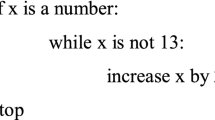Abstract
The paper presents an exploration of conceptual issues that have arisen in the course of investigating speed-up and slowdown phenomena in small Turing machines, in particular results of a test that may spur experimental approaches to the notion of computational irreducibility. The test involves a systematic attempt to outrun the computation of a large number of small Turing machines (3 and 4 state, 2 symbol) by means of integer sequence prediction using a specialized function for that purpose. The experiment prompts an investigation into rates of convergence of decision procedures and the decidability of sets in addition to a discussion of the (un)predictability of deterministic computing systems in practice. We think this investigation constitutes a novel approach to the discussion of an epistemological question in the context of a computer simulation, and thus represents an interesting exploration at the boundary between philosophical concerns and computational experiments.


Similar content being viewed by others
References
Blum, M. (1971). On effective procedures for speeding up algorithms. Journal of Association for Computing Machinery, 18, 290–305.
Calude, C. S., & Stay, M. A. (2005). Most programs stop quickly or never halt. Advances in Applied Mathematics, 40, 295–308.
Deutsch, D. (1998). The fabric of reality: The science of parallel universes and its implications. Penguin (Non-Classics).
Helm, J. P., & Young, P. R. (1971). On size versus efficiency for programs admitting speedup. The Journal of Symbolic Logic, 36, 21–27.
Israeli, N., & Goldenfeld, N. (2004). Computational irreducibility and the predictability of complex physical systems. Physical Review Letters, 92(7).
Joosten, J., Soler, F., & Zenil, H. (2010). Time vs. program-size complexity: Speed-up and slowdown phenomena in small turing machines. International Journal of Unconventional Computing (forthcoming).
Levin, L. (1977). On a concrete method of assigning complexity measures. Doklady Akademii nauk SSSR, 18(3), 727–731.
Lin, S., & Rado, T. (1965). Computer studies of turing machine problems. Journal of Association for Computing Machinery, 12, 196–212.
Meyer, A. R., & Fischer, P. C. (1972). Computational speedup by effective operators. Journal of Symbolic Logic, 37(1), 55–68.
Schnorr, C.-P. (1971). Zufälligkeit und Wahrscheinlichkeit. Eine algorithmische Begründung der Wahrscheinlichkeitstheorie. Berlin: Springer.
Schnorr, C. P. (1973). Does computational speedup concern programing? In M. Nivat (Ed.), Automata, languages and programming. (pp. 585–592). Amsterdam: Elsevier.
Sutner, K. (2003). Cellular automata and intermediate degrees. Theoretical Computer Science, 296, 365–375.
van Emde Boas, P. (1975). Ten years of speedup. In Proceedings of MFCS (pp. 13–29).
Wolfram, S. (2002). A new kind of science. Wolfram Media.
Wolfram Mathematica Documentation Center, FindSequenceFunction. http://reference.wolfram.com/mathematica/ref/DifferenceRoot.html. Accessed October, 2011.
Wolfram Mathematica Documentation Center, DifferenceRoot. http://reference.wolfram.com/mathematica/ref/FindSequenceFunction.html. Accessed October, 2011.
Zenil, H. (2010). Compression-based investigation of the dynamical properties of cellular automata and other systems. Complex Systems, 19(1), 1–28.
Acknowledgments
We want to thank the anonymous reviewers for their valuable suggestions.
Author information
Authors and Affiliations
Corresponding author
Rights and permissions
About this article
Cite this article
Zenil, H., Soler-Toscano, F. & Joosten, J.J. Empirical Encounters with Computational Irreducibility and Unpredictability. Minds & Machines 22, 149–165 (2012). https://doi.org/10.1007/s11023-011-9262-y
Received:
Accepted:
Published:
Issue Date:
DOI: https://doi.org/10.1007/s11023-011-9262-y




